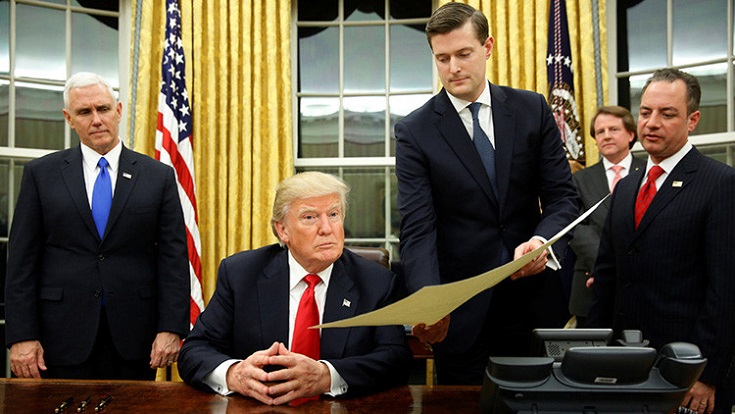Xenia Sobchak was a guest on Morning Joe today, declaring, in perfect English, that she represents those Russians who want their country to be more like the US, (which calls itself exceptional).
Her interview came as Congress miraculously avoided a ‘shutdown’ of the US government, similar to the one that took place about ten days ago. (One of the characteristics of American exceptionalism is that when it comes time to vote a budget, if the parties don’t agree on who gets what — or the President signals that he disagrees with their hard-won compromise — the government — or at least its fringes like national parks and museums — oh, and soldiers’ paychecks — are frozen.)
Other characteristics of exceptional America include the ability of a representative to hold up a vote as long as he/she has breath to keep talking: it’s called a filibuster, and the seventy-something Democratic leader in the House of Representatives came close to delivering one, talking (as several commentators noted) in high heels for eight hours. I missed the explanation of why this didn’t qualify as a filibuster, but as a consolation I witnessed Republican Senator Rand Paul repeatedly invoke a rule that enabled him to demand that those willing to vote to increase the national debt submit an amendment putting forth their position.
Yesterday, the big news was that the White House President’s Secretary, who handles every document that the President sees, was sued for violence against both his ex-wives. We’re told that this may be the reason why, after a year in the White House, Secretary still hasn’t received a security clearance from the FBI. (In line with the US’s permanent fear of ‘the Other’, the fear is that one or both of those ex-wives could blackmail him, forcing him to divulge State secrets.)
The President’s Chief of Staff, former General John Kelly, apparently knew about the charges but didn’t think it was a big deal. Imagine how this information is being received by the women of the ‘Me Too’ movement, which Alt-Right leader Steve Bannon believes is here to stay. And by the way, this is the same John Kelley who referred to the black widow of a serviceman as ‘an empty barrel’ for answering him back when he criticized her over a condolence call from the President; and who recently accused the “Dreamers” (young people brought to the US illegally by their parents who are threatened with deportation) of being too lazy to register so their situation would be regularized if/when the Congress so votes.
The media bounces between salacious stories and accusations of ‘Russia interfering with our democracy’, using the Russia probe to divert attention from the chaos that increasingly appears to be the White House norm. The FBI’s investigation has spawned competing investigations in Congress, both of whose chambers have their own national security committees. These in turn have led, in a dog-biting-tail exercise, to investigations of the FBI itself, via conflicting detailed ‘memos’, each generating endless speculation as to whether the President would ‘declassify’ them so they could be ‘released’ to the public — which ‘has a right to know’. Meanwhile, pundits-for-a-day are invited to opine as to whether the meaning of the words ‘secret society’ contained in one of thousands of emails seized from the computers of two FBI agents who are/were having an affair, referred to something real or was a joke.
Finally, the scandal over the White House Secretary’s treatment of his ex-wives allows the media to bring out seventy-something former Vice-President Joe Biden, known for his impeccable family life and ask him whether he will be a candidate in 2020. Meanwhile, to cover themselves, pundits warn that Donald Trump could well be re-elected in 2020.
Finally, like icing on the cake, the former Russian gay activist and star Putin basher, Masha Gessen, published a strange interpretation of France’s Bastille Day parade as her way of joining the fun over Trump wanting one of his own:
“The Bastille Day military parade in France that apparently inspired Trump is not exactly free of connotations of terror, but its overall symbolism is more appealing. It celebrates the power of the people who overthrew the monarchy and won freedom (though they certainly didn’t wear uniforms or march in lockstep).”
Gessen thinks the Bastille Day Parade is somehow more justified than the annual May 9th parade with which Russia remembers defeating Germany in the Second World War. Will she too be investigated for cheering ‘the power of the people’?
Deena Stryker is an international expert, author and journalist that has been at the forefront of international politics for over thirty years, exlusively for the online journal “New Eastern Outlook”.

